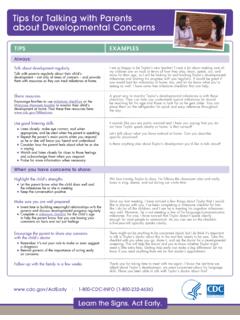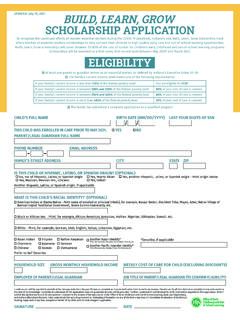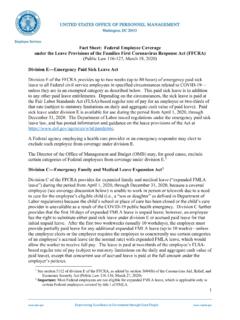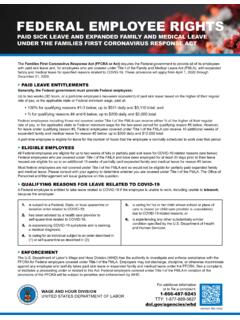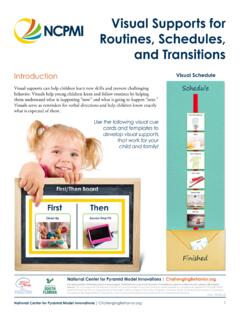Transcription of Research review-importance of families and home
1 A Research review: the importance of families and the home environment By Angelica Bonci, 2008, revised June 2010 by Emily Mottram and Emily McCoy and March 2011 by Jennifer Cole National Literacy Trust All written materials, literature, drawings, photographic images, icons, artworks and other graphical images in this document are copyright works belonging to the National Literacy Trust. Such copyright material may not be used unless a licence is obtained from the National Literacy Trust. Any unauthorised publication, copying, hiring, lending or reproduction is strictly prohibited and constitutes a breach of copyright. This report is the property of the National Literacy Trust and is protected by Copyright law. The National Literacy Trust will consider requests to use extracts or data from this publication provided that you: Acknowledge that the content is the work of the National Literacy Trust and provide appropriate references in any publications or accompanying publicity.
2 Please use the following format: McCoy, E, Cole, J. (2011). A Snapshot of Local Support for Literacy: 2010 survey. London: National Literacy Trust. State that any views expressed are yours and not necessarily those of National Literacy Trust. TABLE OF CONTENTS Summary 2 The Research evidence 3 The significance of parental involvement and the home learning environment 3 The significance of parental involvement in their child s earliest years 5 The big picture: trends in family life 7 Definitions and taxonomy 11 References 20 Copyright National Literacy Trust (A Research review: the importance of families and the home environment, Angelica Bonci) (2008, revised 2010 and March 2011) 2 SUMMARY Learning is complex; it begins at birth and continues throughout life.
3 Parents are the first teachers and role models for their children, and therefore have a strong influence on their learning. Yet, studies continue to show that many parents are not aware of the importance they play in their child s education and have a limited understanding of their role in their children s learning (DCSF, 2007). In the last three decades, several strands of Research have produced compelling evidence justifying a focus on the family with a particular emphasis on early years in order to raise literacy standards. The key Research findings are: families and parents are critical to children s attainment. Parental involvement in their child s literacy practices positively affects children s academic performance and is a more powerful force for academic success than other family background variables, such as social class, family size and level of parental education.
4 The home is crucial. Parents have the greatest influence on the achievement of young people through supporting their learning in the home rather than supporting activities in school. Early intervention is vital. The earlier parents become involved in their children s literacy practices, the more profound the results and the longer-lasting the effects. Children learn long before they enter formal education. Parents are a child s first educator. A child s family and home environment has a strong impact on his/her language and literacy development and educational achievement. This impact is stronger during the child s early years but continues throughout their school years. Many background variables affect the impact of the family and home environment (such as socio-economic status, level of parental education, family size, etc.)
5 But parental attitudes and behaviour, especially parents involvement in home learning activities, can be crucial to children s achievement and can overcome the influences of other factors. Therefore, any policy aiming to improve literacy standards cannot be limited to formal educational settings, where children spend only a small proportion of their time. On the contrary, it needs to embrace the family as a whole and include parents as partners in their children s education from the very beginning of their children s lives. It should aim to raise parents awareness of the difference they can make and set up systems that offer constant encouragement and support according to individual requirements and needs. This paper looks in detail at the range of Research underpinning the National Literacy Trust s work with communities and local areas to embed a strategic approach to literacy.
6 Copyright National Literacy Trust (A Research review: the importance of families and the home environment, Angelica Bonci) (2008, revised 2010 and March 2011) 3 THE Research EVIDENCE The significance of parental involvement and the home learning environment Parents attitudes and support for their children s learning influence performance on literacy tests irrespective of socio-economic status (Tizard, Blatchford, Burke, Farquhar and Plewis, 1988; Wells, 1987). Parental involvement in their child s literacy practices positively affects children s academic performance (Fan and Chen, 2001) and is a more powerful force for academic success than other family background variables, such as social class, family size and level of parental education (Flouri and Buchanan, 2004).
7 Specifically parental involvement with reading activities at home has significant positive influences not only on reading achievement, language comprehension and expressive language skills (Gest, Freeman, Domitrovich, and Welsh, 2004), but also on pupils interest in reading, attitudes towards reading and attentiveness in the classroom (Rowe, 1991). Parents make the greatest difference to achievement through supporting their learning in the home rather than supporting activities in the school (Harris and Goodall, 2007). Longitudinal studies, provide Research evidence confirming that parental involvement in learning activities in the home is strongly associated with children s better cognitive achievement, particularly in the early years (such as Sylva, Melhuish, Sammons, Siraj-Blatchford, and Taggart,1999 and Melhuish, Sylva, Sammons, Siraj-Blatchford, and Taggart, 2001, see also Harris and Goodall, 2007).
8 Family involvement at school Feinstein and Symons (1999) found that parental interest in their child s education was the single greatest predictor of achievement at age 16. In a recent study (Dearing, Kreider, Simpkins and Weiss, 2006) for the Harvard Family Research Project, it was found that family involvement in school matters most for children whose mothers have less education. More specifically, the authors found that increases in family involvement in the school predicted increases in literacy achievement for low income families and that family involvement in school matters most for children at greatest risk. More specifically, Dearing and colleagues found that if families who were initially uninvolved in the school became more involved, their children's literacy improved.
9 Importantly, their results indicated that even one or two additional involvement activities per year were associated with meaningful improvements for children. Copyright National Literacy Trust (A Research review: the importance of families and the home environment, Angelica Bonci) (2008, revised 2010 and March 2011) 4 Parental education, skills and attitude There is a link between parents and children s literacy levels1: Several recent studies found that parents with low literacy levels: are less likely to help their children with reading and writing (Williams, Clemens, Oleinikova, and Tarvin, 2003; Parsons and Bynner, 2007); feel less confident in doing so (Williams et al., 2003); are less likely to have children who read for pleasure (Parsons and Bynner, 2007); are more likely to have children with lower cognitive and language development levels (De Coulon, Meschi and Vignoles, 2008).
10 2NB these links have been challenged see footnote. The context provided by parents and their consistent support might be more important than any transfer of skills [for their children s literacy development] (Auerbach, 1989, p. 171). Parental education level has an impact on young children s cognitive and language development: Parents level of education correlates with the cognitive development of babies between 12 months and 27 months of age (Roberts, Bornstein, Slater and Barrett, 1999). Data obtained from a study of 16,000 three-year-old children, who were assessed within the framework of the British Millennium Cohort Study (George, Hansen and Schoon, 2007), indicated that children with the most educated parents (who had degree-level or above qualifications) were on average about 12-13 months ahead of those with the least educated parents (who had no qualifications)3.











